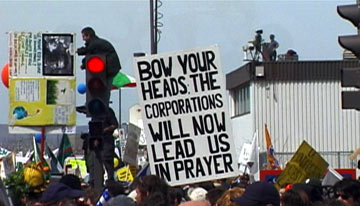

A strange thing is happening this year in the movies, especially documentaries. People are developing voices. And in today's politically divided climate with an election looming, the predominant voice to emerge in recent documentaries is the liberal one. Of these films, The Corporation towers above the rest (Fahrenheit 9/11, Outfoxed, Uncovered, Orwell Rolls in His Grave, Bush's Brain…). The Corporation is an extensively researched, well-thought out, and entertaining documentary. It takes pains to interview people on both sides of the issue (something that most of the aforementioned docs ignore) and includes CEOs of large, well respected firms, professors, and luminaries like Peter Drucker, Noam Chomsky, and Milton Friedman. It also lays out its arguments slowly and methodically, adding in an exhaustive amount of research and background information to inform the viewer as much as possible. And while the viewpoint that the filmmakers espouses is strong, it is not lost amidst loud rhetoric. It's too bad that one of its most entertaining conclusions, that the corporate entity is psychopathic, falls into a huge logical hole. Oddly enough, it manages to succeed in other places.
The main point of The Corporation is to show that it is time to take a closer look at this ubiquitous entity. Large corporations can pretty much run rampant, and can insinuate themselves into the lives of consumers in very slick ways and sometimes exert strong control over governments. Governments and consumers need to be aware of what is happening, and there needs to be increased oversight. Most importantly, corporations themselves need to change the way they think. This is an especially hard thing to do given that corporations are beholden to their stockholders, and their stockholders want them to make a profit. Things like low pay in third world countries and the environment don't really matter to stockholders in the big picture. Should they? In fact, The Corporation sets out to prove that corporations are psychopaths, as defined by the World Health Organization. To do this, they take the various symptoms of psychopathy, then use an example to illustrate how a company met that symptom. Here is where The Corporation fizzles. At the beginning of the film, there is a clip of George Bush saying that the vast majority of corporations are good. By picking and choosing examples from the bad ones, and then saying that all corporations are bad is a fallacy. It would be the same thing to examine mass murderers for psychopathy, then conclude that the human race as a whole is psychopathic. At the same time, the bad examples abound. Enron, WorldCom, Martha Stewart, Arthur Andersen, and many others get small mentions.
Thankfully, it seems that directors Jennifer Abbott and Mark Achbar (Two Brides and a Scalpel: Diary of a Lesbian Marriage) are using the analogy to shed light on corporations in general, and maybe even for comic relief. They take a case study approach to various things they feel are sins, and delve deeply into the subject, beginning with how corporations came to be and why it was good for business. And it is in these case studies The Corporation truly shines. The star of the film is Ray Anderson, CEO of Interface, the world's largest carpet manufacturer. He fully admits to having no environmental vision until prompted by customers. The following years showed a tremendous change in heart for Anderson, who know feels a greater responsibility to the environment. He argues fervently about the importance of being a steward for future generations, and it is hard to doubt his sincerity. It's hard to argue that corporations are evil when Abbot and Achbar interview him so extensively. Harder to pinpoint is Sir Mark Moody-Stuart, a former chairman of Royal Dutch Shell. He falls more neatly into the argument that corporations will be environmentally friendly because it is good for their business. Moody-Stuart avows the importance of being green (and in a very amusing segment manages to pacify some activists who came to protest at his house), yet The Corporation shows how Shell is still polluting some third world countries.
Another highly informative segment involves corporate influence over the news. In an extended interview, Fox reporters Steve Wilson and Jane Akre recount their uphill battle to air a report damning Monsanto and their use of synthetic hormones in cows. The use of rGCH is illegal in Canada and Europe, but fine in the United States. Fox, fearing a lawsuit, caved into pressure from their lawyers and effectively killed the story. Fortunately, Wilson and Akre are smart people, and kept fighting away, and at least the story about their struggle can now come out. This segment alone is better than all of Orwell Rolls in his Grave, an entire documentary about the media.
And amazingly, there is more. The two and a half hours goes by remarkably quickly, as writers Joel Bakan and Harold Crooks (Night's Noontime) touch upon subject after subject in a systematic manner. Heck, they even make Michael Moore look sane. The one big drawback about The Corporation is that it has little focus. It does not present one central thesis, but instead grabs handfuls of subjects and throws them quickly at the viewer. Undercover marketing, the branding of America, Nazi collaboration, and seed activism all get their share. And this is where Abbott and Achbar accidentally succeed. They have presented a great starting point. The Corporation has a lot of fascinating information, enough to get people to question some of their current beliefs about corporations and get them thinking about alternatives. To further their questions, a series of urls appear along the bottom of the screen as the credits roll.